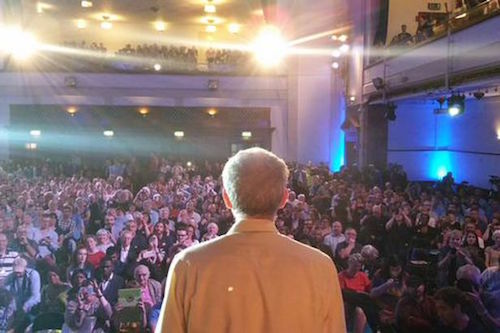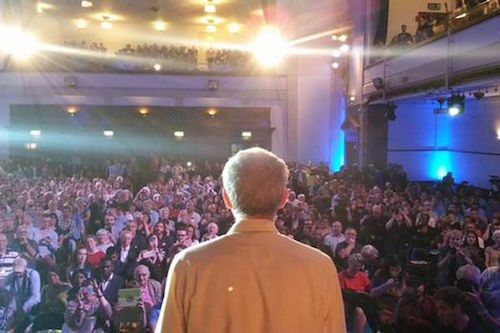Nick Srnicek: After the Party

Jeremy Corbyn has, once again, emerged victorioius from a Labour leadership contest, but in the weeks since a number of his decisions have risked alienating his support-base.
What do the confusions over his policies on immigration and his recent decision to speak at the Stand Up To Racism event say for the future of Corbynism as a social movement? In this essay Nick Srnicek, co-author of Inventing the Future: Postcapitalism and a World Without Work, analyses Corbyn's leadership not, as most have, with an eye to his critics on the right, but from the left. 
[CN: rape, hate crimes]
After a bruising, but professionally run, leadership campaign, Corbynism celebrated in style in Liverpool. The Momentum-run festival, The World Transformed, was by all accounts (including my own) both an optimism-inspiring meeting of people, as well as a chance to relax and party after the hard slog of the leadership campaign. Now, some weeks on from that moment, Corbynism at last has the time and space to face up to the immense challenges of Brexit and a rising conservativism. While the eyes of most Corbyn supporters and allies have understandably been on critics to the right, Corbynism risks alienating a key element if it ignores critics from the left.
The most recent episode of this is Corbyn’s decision to attend and speak at the Stand Up To Racism (SUTR) event. No one denies Corbyn’s principled stance against racism, but the problem with this event was that it was organised and run as a Socialist Workers’ Party (SWP) front. The SWP, for those who are unaware, recently lost most of its members after it emerged that the Central Committee had covered up rape allegations against one of its members, and had bullied various members into silence. Weymen Bennett, one of the key figures in this scandal, was one of the main organisers behind the SUTR event, giving even more reason for Corbyn to avoid speaking at this event. Yet, Corbyn chose to stand up alongside Bennett and to give legitimacy to a SWP-event. It is unclear why he chose to do so – perhaps a sense of comradely solidarity to another long-time leftist – but in any case it was a major mistake. No credence can be given to the rape-apologists of the SWP, and the British left will be a better place when their last member finally quits. For Corbyn to attend the event shows a worrying (and surprising) disregard for the victims of sexual abuse. It also shows a worrying disregard for the concerns of the social movements around him, who strongly petitioned him to avoid the event. It does not bode well for Corbynism-as-a-social-movement, if it does not take its grassroots members seriously. At this point, Corbyn needs to make clear that this will not happen again. Private assurances will not do – there needs to be a public break with the SWP, its fronts, and the members of the Central Committee.
The second major concern emerging from the tendencies of Corbynism is the confusion over immigration controls. As individuals, I have no doubt that Corbyn and McDonnell both support open borders (McDonnell has even called for open borders globally). This is one of the primary reasons I support Corbyn – as an important bulwark against a society that is increasingly hostile to difference. But as a party, Labour is much more confused. Even Corbyn’s statements betray the ambiguity of the party, teetering at times between saying migrants are valued members of society and that there are also too many of them. The matter is not helped when Keir Starmer, the Shadow Secretary of State for Exiting the EU, comes out and says that immigration controls must be part of the negotiation over Brexit. Beyond the moral case for ending borders, there are also blunt electoral reasons to put forward a clear pro-migrant stance. In the first place, Labour can try to play the xenophobic game, but it will always fail to be more credible than the Tories or UKIP on this issue. The encroaching xenophobia and racism in Britain also won’t be stopped by continuing to blame migrants for the problems of society. Buying into the framing of your opponent – “immigrant numbers must be reduced” – is to already give up the game and accept you’ve lost. But just as important is the issue of Brexit. No serious observer believes that the UK can retain tariff-free access to the single market without also accepting the conditions that come along with it – including free movement of labour. Simply put, there is no way the EU countries will accept that negotiation outcome. Given how many people have no appetite for the economic turmoil that exiting the single market would bring, there is a vast electoral group who could rally behind a party which put forth a clear and realistic case for staying in the single market. But that requires being open and transparent about the free movement of labour, and it requires changing the debate. Corbynism can play a major role in this task, and it is – in a time of rising hate crimes – perhaps its historic role to battle against these reactionary forces.
The reasons for these problems in Corbynism are not too difficult to pinpoint. On one level, there is simply the immense difficulty of swimming against a media current that demonises foreigners at every chance. Given those circumstances, it is not surprising that the electorally-minded would consider tossing in the towel and accepting xenophobia. The consequences be damned, there’s an election to win. On another level, these issues also arise out of different generational patterns of leftism. For the older generation, sectarianism, defensiveness, and unquestioning solidarity were key attributes in a hostile environment. It is perhaps this which explains (though doesn’t justify) Corbyn’s attendance at the SUTR event. By contrast, among the younger generation on the left, many people are politically promiscuous – happy to support the Green Party in one election, camp out with Occupy London another time, march against Labour-supported cuts, and then move to support Corbyn without so much as blinking an eye. The thread which runs through the young left is a deep commitment to certain principles: anti-sexism, anti-racism, anti-austerity, and increasingly, anti-capitalism. The organisational form which appears to be the most viable for fulfilling these principles is the one that young leftists will flock to. Rather than sectarianism, the youth are often adept with organisational pluralism. But this means that, equally, if a movement appears to be deviating from those ideals, these individuals will leave just as quickly.
The significance of losing the activist and radical left is perhaps marginal in electoral terms. But this is the group which could actually enable Corbynism to become the social movement it desires to be. This group of people will be the ones organising housing activists, protesting racism and police brutality, providing support to the worst-off in society, and introducing a constant influx of new ideas. If Corbyn’s Labour is to be more than a re-hash of old trade union elite allying with the political elite, it must be receptive to these critiques from the grassroots left. Given the rampant media attack on Corbyn, it is understandable that people are defensive against any perceived critics. But Corbyn supporters must accept that some critiques of Corbyn are right, and that Corbyn is simply a figurehead for something much bigger and more powerful. He is not beyond reproach, and the moment he becomes idolised as such, is the moment that the movement dies. If Corbynism is to actually reach into communities that have been left behind; if it is to build up a counterpower against the (small-c) conservative forces of the media and business elite; and if it is to build a counterhegemonic project – it cannot take its left critics for granted. Otherwise Labour will learn there is more than just the party.
[Thanks to the comrades who have helped in formulating this piece.]
The new and updated edition of Nick Srnicek and Alex Williams's Inventing the Future: Postcapitalism and a World Without Work is available to purchase now from the Verso website with a 30% discount, free worldwide shipping, and a free bundled ebook.